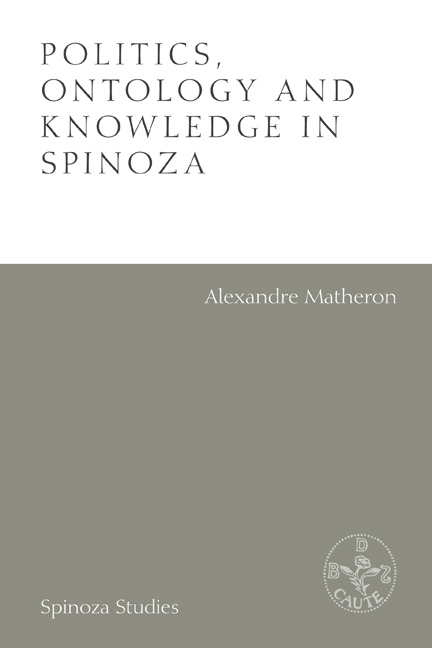Book contents
- Frontmatter
- Contents
- Abbreviations
- Notes on Translation and Acknowledgements
- A Revolutionary Beatitude: Alexandre Matheron’s Spinozism
- I Spinoza on Ontology and Knowledge
- 1 Idea, Idea of the Idea and Certainty in the Tractatus de Intellectus Emendatione and the Ethics
- 2 Essence, Existence and Power in Part I of the Ethics: The Foundations of Proposition 16
- 3 Physics and Ontology in Spinoza: The Enigmatic Response to Tschirnhaus
- 4 The Year 1663 and the Spinozist Identity of Being and Power: Hypothesis on a Development
- 5 Eternal Life and the Body According to Spinoza
- 6 Intellectual Love of God, Eternal Part of the amor erga Deum
- II Spinoza on Politics and Ethics
- 7 State and Morality According to Spinoza
- 8 Ethics and Politics in Spinoza (Remarks on the Role of Ethics IV, 37 Scholium 2)
- 9 Indignation and the Conatus of the Spinozist State
- 10 Passions and Institutions According to Spinoza
- 11 The Problem of Spinoza's Evolution: From the Theologico-Political Treatise to the Political Treatise
- 12 Is the State, According to Spinoza, an Individual in Spinoza’s Sense?
- 13 The Ontological Status of Scripture and the Spinozist Doctrine of Individuality
- 14 Spinoza and Power
- 15 Spinoza and Property
- 16 Spinoza and Sexuality
- 17 Women and Servants in Spinozist Democracy
- 18 The ‘Right of the Stronger’: Hobbes contra Spinoza
- 19 The Theoretical Function of Democracy in Spinoza and Hobbes
- 20 Spinoza and the Breakdown of Thomist Politics: Machiavellianism and Utopia
- Appendix 1 Interview with Laurent Bove and Pierre-François Moreau
- Appendix 2 Chronology of Works by Matheron
- Works Cited
- Index
18 - The ‘Right of the Stronger’: Hobbes contra Spinoza
Published online by Cambridge University Press: 03 October 2020
- Frontmatter
- Contents
- Abbreviations
- Notes on Translation and Acknowledgements
- A Revolutionary Beatitude: Alexandre Matheron’s Spinozism
- I Spinoza on Ontology and Knowledge
- 1 Idea, Idea of the Idea and Certainty in the Tractatus de Intellectus Emendatione and the Ethics
- 2 Essence, Existence and Power in Part I of the Ethics: The Foundations of Proposition 16
- 3 Physics and Ontology in Spinoza: The Enigmatic Response to Tschirnhaus
- 4 The Year 1663 and the Spinozist Identity of Being and Power: Hypothesis on a Development
- 5 Eternal Life and the Body According to Spinoza
- 6 Intellectual Love of God, Eternal Part of the amor erga Deum
- II Spinoza on Politics and Ethics
- 7 State and Morality According to Spinoza
- 8 Ethics and Politics in Spinoza (Remarks on the Role of Ethics IV, 37 Scholium 2)
- 9 Indignation and the Conatus of the Spinozist State
- 10 Passions and Institutions According to Spinoza
- 11 The Problem of Spinoza's Evolution: From the Theologico-Political Treatise to the Political Treatise
- 12 Is the State, According to Spinoza, an Individual in Spinoza’s Sense?
- 13 The Ontological Status of Scripture and the Spinozist Doctrine of Individuality
- 14 Spinoza and Power
- 15 Spinoza and Property
- 16 Spinoza and Sexuality
- 17 Women and Servants in Spinozist Democracy
- 18 The ‘Right of the Stronger’: Hobbes contra Spinoza
- 19 The Theoretical Function of Democracy in Spinoza and Hobbes
- 20 Spinoza and the Breakdown of Thomist Politics: Machiavellianism and Utopia
- Appendix 1 Interview with Laurent Bove and Pierre-François Moreau
- Appendix 2 Chronology of Works by Matheron
- Works Cited
- Index
Summary
It is generally agreed that Jean-Jacques Rousseau, in the critique that he levels against the ‘right of the stronger’ in Chapter III of Book I of The Social Contract, is above all attacking Hobbes; sometimes it is added that he is also attacking Spinoza. Now this is quite possible, even if it might address only a minor aspect of the question. But supposing that these are indeed the two adversaries that Rousseau targets, does this critique hit its mark?
Let us briefly recall in what this critique consists. Rousseau first of all indicates the aim pursued by those he is after, namely to secure an inviolable legitimacy for whomever actually possesses power [pouvoir]: ‘The stronger is never strong enough to be forever master, unless he transforms his force into right, and obedience into duty. Hence the right of the stronger.’ After this comes a brief characterisation of the thesis in question. On the one hand, the ‘right of the stronger’ is ‘apparently understood ironically’: since right must add something to the force of the stronger in order to reinforce it, it is important to declare that the two must not be confused, and even to condemn those who reduce the former to the latter; this is why one agrees that it is a ‘moral power [pouvoir moral]’. But, on the other hand, the ‘right of the stronger’ is ‘in principle really established’: since the objective is to justify existing powers [pouvoirs], it is important to ground the theory of right on principles from which one could always deduce, whatever the case may be, that whoever possesses force has, as if by chance, the right to it; and this amounts to including this conclusion, in a disguised form, in advance. In other words, the thesis of the ‘right of the stronger’ consists in two equally indispensable propositions, but of which only one is explicit, whereas the other only plays its role via the intermediary of its applications without ever being stated as such:
Proposition 1 (explicit): Right is a moral power [pouvoir] whose nature has nothing in common with that of a physical power [pouvoir].
Proposition 2 (implicit): Force gives right.
- Type
- Chapter
- Information
- Politics, Ontology and Knowledge in Spinoza , pp. 280 - 306Publisher: Edinburgh University PressPrint publication year: 2020

